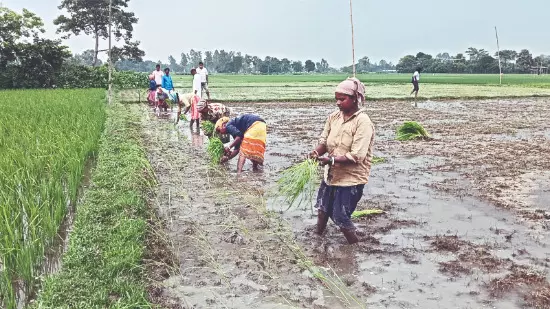Move initiated to revive aroma & quality of famed Tulaipanji rice of Raiganj

Raiganj: Tulaipanji, the famed indigenous aromatic rice grown in the Raiganj subdivision of North Dinajpur (Uttar Dinajpur) district, is showing signs of decline in aroma and quality due to overuse of chemical fertilisers.
Once celebrated for its soft texture, bright appearance and lingering fragrance, the rice’s traditional allure is at risk. With high production costs coupled with low yields, many farmers are shifting to more lucrative maize crops.
However, an emerging movement in Bhattadighi, Raiganj is striving to revive Tulaipanji cultivation through scientific, organic methods. Farmers in this area are returning to traditional techniques using only organic fertilisers such as cow dung, cow urine and decomposed leaves and natural pesticides like neem‑leaf juice. These practices are helping restore the rice’s distinctive aroma and premium market value. One of the pioneers is Tipu Mandal of Bhattadighi, who for nearly 10 years has cultivated Tulaipanji organically. He reports harvesting approximately 3 quintals of fragrant paddy per bigha at a cost of just Rs 2,500.
The paddy sells for over Rs 27,000 yielding substantial profit. “We use cow dung, cow urine, rotten leaves… and as pesticide we use cow urine and neem juice,” he explained, urging fellow farmers to adopt the model for both quality and profit. Tulaipanji earned national recognition after being showcased at the London Olympics food festival in 2012, and received a Geographical Indication (GI) tag from the Government of India in 2014 (registered officially in 2017).
The villages of Mahiniganj, Bahar, Bhogilota, Kantar, Runia, Jaonia, Bhattadighi and Maslandapur are among the key production zones. Sowed in August and harvested between late November and mid‑December, Tulaipanji retains its aroma by abstaining from the use of strong chemical fertilisers that make the soil dry.
While challenges such as adulteration of seeds, marketing inefficiencies and branding gaps persist, the renewed interest in Tulaipanji powered by organic methods and farmer‑led initiatives offers a promising path toward sustainable revival. With rising prices in local and urban markets and support from agricultural extension services, the fragrant rice has a chance to reclaim its glory.
Tusar Kanti Chowdhury, Assistant Director of the Raiganj Block Agriculture Office, confirms that farmers in Bhattadighi and surrounding villages have adopted these organic practices and said: “Their rice with great aroma is commanding high prices in the market. As a result, interest in Tulaipanji cultivation is rising and the cultivated area under this aromatic rice has expanded this year. ”



